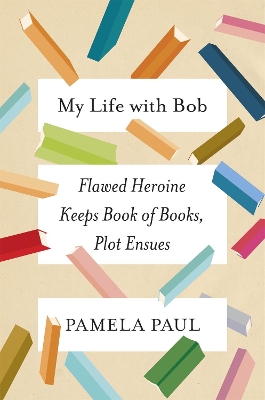
Pamela Paul has kept a single book by her side for twenty-eight years - carried throughout high school and college, hauled from Paris to London to Thailand, from job to job, safely packed away and then carefully removed from apartment to house to its current perch on a shelf over her desk - reliable if frayed, anonymous-looking yet deeply personal. This book has a name: Bob. Bob is Paul's Book of Books, a journal that records every book she's ever read, from Sweet Valley High to Anna Karenina, from Catch-22 to Swimming to Cambodia, a journey in reading that reflects her inner life - her fantasies and hopes, her mistakes and missteps, her dreams and her ideas, both half-baked and wholehearted. Her life, in turn, influences the books she chooses, whether for solace or escape, information or sheer entertainment. But My Life with Bob isn't really about those books. It's about the deep and powerful relationship between book and reader. It's about the way books provide each of us the perspective, courage, companionship, and imperfect self- knowledge to forge our own path. It's about why we read what we read and how those choices make us who we are. It's about how we make our own stories.
I had no real idea what to expect from this book; the subtitle guaranteed I was going to read it, but how do you write a book about your personal reading list?
You don't, as it turns out. You use it as context, a frame from which you hang your memoirs. That's not to say that books and a love of reading isn't prominent - it is. I'd call it a 60/40 split, memoir to books. But at the end, the reader is going to know way more about Pamela Paul than about her list of books read.
And Pamela Paul is an interesting person on paper (I don't presume to know what she'd be like in reality). Some readers might find the focus on her world travels heavy-handed, but she spends enough time on her childhood to make it clear hers was not a privileged upbringing. She and I are the same age, and our lives, both in childhood and early adulthood have some interesting parallels, although quite a few ginormous differences. (Among others, she assumes every girl of our generation who read A Wrinkle in Time found it a life changing classic. I did not. Even as a kid I was bored by all things space, dooming it from the start, but I clearly remember reading it as part of my schoolwork and thinking it heavy-handed and ... please forgive me for saying this, condescending.)
Overall, I felt it easy to relate to her and the inner-self she lets the reader see, and how books played a pivotal part. Just about everything I read about the book beforehand mentioned the humor and wit with which it was written. I can see that's true, but - and this bugged me the entire time, because I couldn't figure out why - I couldn't feel it. I knew there were parts that were meant to be funny, but they didn't affect me the way they were meant to, nor the way I thought they should have. Somehow, the timing of my reading and her writing were off. This meant that while I really enjoyed the book, I finished it feeling like there was a failure somewhere in the transmission from the page to my brain.
It's a thought provoking read both in terms of how and what we read, and the events of our lives. Will possibly do terrible things to a reader's TBR.
Reading updates
-
Started reading
-
2 April, 2018:
Finished reading
-
2 April, 2018:
Reviewed
